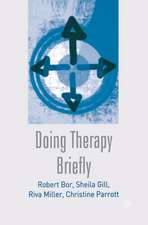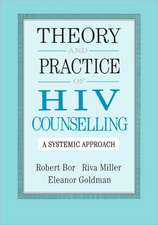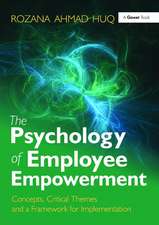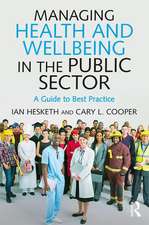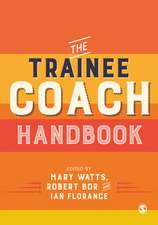Life After Work: A Psychological Guide to a Healthy Retirement
Autor Robert Bor, Carina Eriksen, Lizzie Quartermanen Limba Engleză Paperback – 29 oct 2018
Retirement is on one level a private, individual matter that affects one’s sense of self and purpose, physical and mental processes, as well as financial security or provision. On another level, retirement has an impact on relationships with loved ones, family and friends, as well as colleagues. It can strengthen or disrupt bonds, leading to new bonds being formed or to withdrawal. This book is written by successful authors and psychologists Robert Bor, Carina Eriksen and Lizzie Quarterman, each with many years’ experience of helping people cope with life stage changes and prepare for retirement. It contains illustrative case studies throughout, from which valuable lessons can be learned, and draws on the very latest psychological research and techniques to provide a blueprint for planning and living a wonderful retirement or life post-work.
Planning for your future is crucial in enabling you to maximise the opportunities available. Following the book’s blueprint will help you prepare for this phase in your life, and the sooner you start the better. Life After Work will be of great interest to readers of all ages seeking guidance on retirement and will also appeal to psychologists of life stage changes.
| Toate formatele și edițiile | Preț | Express |
|---|---|---|
| Paperback (1) | 265.57 lei 6-8 săpt. | |
| Taylor & Francis – 29 oct 2018 | 265.57 lei 6-8 săpt. | |
| Hardback (1) | 885.07 lei 6-8 săpt. | |
| Taylor & Francis – 30 oct 2018 | 885.07 lei 6-8 săpt. |
Preț: 265.57 lei
Nou
Puncte Express: 398
Preț estimativ în valută:
50.83€ • 55.23$ • 42.73£
50.83€ • 55.23$ • 42.73£
Carte tipărită la comandă
Livrare economică 21 aprilie-05 mai
Preluare comenzi: 021 569.72.76
Specificații
ISBN-13: 9781138335851
ISBN-10: 1138335851
Pagini: 128
Dimensiuni: 138 x 216 x 13 mm
Greutate: 0.16 kg
Ediția:1
Editura: Taylor & Francis
Colecția Routledge
Locul publicării:Oxford, United Kingdom
ISBN-10: 1138335851
Pagini: 128
Dimensiuni: 138 x 216 x 13 mm
Greutate: 0.16 kg
Ediția:1
Editura: Taylor & Francis
Colecția Routledge
Locul publicării:Oxford, United Kingdom
Public țintă
General, Professional, and Professional Practice & DevelopmentCuprins
Foreword by Professor Brett Kahr
Introduction
Chapter 1: The changing face of retirement
What is retirement?
Why has retirement changed?
Longevity
Health advances
Government encouragement to offset demographic change
Higher standard of living
Higher cost of living
Identification
Chapter 2: Psychological perspectives
Why is psychology relevant?
Assumptions
Impact of thoughts
Negative expectations
Positive expectations
Some of the things you may miss
Thinking traps
Fear of change
How people react to change
Psychological techniques to overcome fear
How to avoid overreacting
Factors that affect "healthy" adjustment
Emotional instability
Chapter 3: The maturing brain
What happens to the mature mind?
Mental processing as we age
Dementia
Keeping your brain fit
Common "purposeful" activities
Giving back
Volunteering
Become a trustee
Mentoring
Join an altruistic society, or become a fundraiser
Pass on your skills
The power of play
Use it or lose it
More tips for improving your mental health
Chapter 4: Psychological approaches to challenging feelings and behaviours
Fear, worry and anxiety: Thinking errors
Strategies for coping with fear, worry and anxiety
Low mood
Strategies for dealing with low mood
Loss, grief and bereavement
Strategies for coping with loss
Sleep problems
Strategies for dealing with sleep problems
Loneliness
Strategies to help you deal with loneliness
Addictions
Strategies for coping with addictions
Chapter 5: Retirement and emotions
Loss
Emotional stress
Low mood
Uncertainty
Unhappiness
Chapter 6: The impact on relationships
The impact
Overcoming relationship difficulties
The impact of retirement on home life
Relationship tips
Develop separateness
Gender, sex and problems
Relationship breakdown and dealing with divorce
Chapter 7: Life after work, or unretirement
Leaving the workplace
How to retire from self-employment
How to retire from unemployment
What next?
Carry on working
Setting up on your own
Beware the traps
The volunteering trap
The failing to fly the nest trap
The caring trap
Chapter 8: Mind your health
Quick fix for successful ageing
Move
Exercise
Diminishing muscle mass
So what’s the solution?
Brain function
Food
Mediterranean diet
Balance your blood sugar
Nourish yourself
Eat mindfully
Track yourself
Retirement as an opportunity to improve your health
Chapter 9: Mind your money – financial planning for retirement
How much income will you need?
How much capital will you need?
Annuities
What return do you need?
Tax relief and legislation
Money in bricks
Chapter 10: Bringing it all together – the blueprint for a psychologically sound unretirement
Planning ahead
Start saving
Prepare for old age
Your 20-point retirement blueprint
Resources
Further reading
Organisations and links
About the authors
Professor Rob Bor
Dr Carina Eriksen
Lizzie Quarterman
Contributors
Steve Leonard
Oliver Patrick
Introduction
Chapter 1: The changing face of retirement
What is retirement?
Why has retirement changed?
Longevity
Health advances
Government encouragement to offset demographic change
Higher standard of living
Higher cost of living
Identification
Chapter 2: Psychological perspectives
Why is psychology relevant?
Assumptions
Impact of thoughts
Negative expectations
Positive expectations
Some of the things you may miss
Thinking traps
Fear of change
How people react to change
Psychological techniques to overcome fear
How to avoid overreacting
Factors that affect "healthy" adjustment
Emotional instability
Chapter 3: The maturing brain
What happens to the mature mind?
Mental processing as we age
Dementia
Keeping your brain fit
Common "purposeful" activities
Giving back
Volunteering
Become a trustee
Mentoring
Join an altruistic society, or become a fundraiser
Pass on your skills
The power of play
Use it or lose it
More tips for improving your mental health
Chapter 4: Psychological approaches to challenging feelings and behaviours
Fear, worry and anxiety: Thinking errors
Strategies for coping with fear, worry and anxiety
Low mood
Strategies for dealing with low mood
Loss, grief and bereavement
Strategies for coping with loss
Sleep problems
Strategies for dealing with sleep problems
Loneliness
Strategies to help you deal with loneliness
Addictions
Strategies for coping with addictions
Chapter 5: Retirement and emotions
Loss
Emotional stress
Low mood
Uncertainty
Unhappiness
Chapter 6: The impact on relationships
The impact
Overcoming relationship difficulties
The impact of retirement on home life
Relationship tips
Develop separateness
Gender, sex and problems
Relationship breakdown and dealing with divorce
Chapter 7: Life after work, or unretirement
Leaving the workplace
How to retire from self-employment
How to retire from unemployment
What next?
Carry on working
Setting up on your own
Beware the traps
The volunteering trap
The failing to fly the nest trap
The caring trap
Chapter 8: Mind your health
Quick fix for successful ageing
Move
Exercise
Diminishing muscle mass
So what’s the solution?
Brain function
Food
Mediterranean diet
Balance your blood sugar
Nourish yourself
Eat mindfully
Track yourself
Retirement as an opportunity to improve your health
Chapter 9: Mind your money – financial planning for retirement
How much income will you need?
How much capital will you need?
Annuities
What return do you need?
Tax relief and legislation
Money in bricks
Chapter 10: Bringing it all together – the blueprint for a psychologically sound unretirement
Planning ahead
Start saving
Prepare for old age
Your 20-point retirement blueprint
Resources
Further reading
Organisations and links
About the authors
Professor Rob Bor
Dr Carina Eriksen
Lizzie Quarterman
Contributors
Steve Leonard
Oliver Patrick
Notă biografică
Professor Rob Bor is a Consultant Psychologist at the Royal Free Hospital and also in private practice as Dynamic Change Consultants as well as the Centre for Aviation Psychology. He works at Leaders in Oncology Care, The London Clinic, St Paul’s School, The Royal Ballet School, The Royal Air Force and several UK airlines. He divides his time between London and the Cotswolds, and has young twins and a cocker spaniel.
Dr Carina Eriksen is a registered and chartered Consultant Counselling Psychologist. She runs a busy private practice in central London, Chelsea and the City. She is a fellow at the BPS, a BPS board committee member in aviation psychology and a BABCP accredited therapist. She is married with two young children.
Lizzie Quarterman lives on a National Trust farm in Gloucestershire with her husband and several characterful cocker spaniels. She grows vegetables and paints landscapes and in professional life is an experienced writer and editor of business and psychology books and articles.
Dr Carina Eriksen is a registered and chartered Consultant Counselling Psychologist. She runs a busy private practice in central London, Chelsea and the City. She is a fellow at the BPS, a BPS board committee member in aviation psychology and a BABCP accredited therapist. She is married with two young children.
Lizzie Quarterman lives on a National Trust farm in Gloucestershire with her husband and several characterful cocker spaniels. She grows vegetables and paints landscapes and in professional life is an experienced writer and editor of business and psychology books and articles.
Descriere
Life After Work looks at the psychological, emotional and wellbeing issues that surround this complex and important transition in life. Planning for your future is crucial in enabling you to maximise the opportunities available. Following the book’s blueprint will help you prepare for this phase in your life, and the sooner you start the better.


